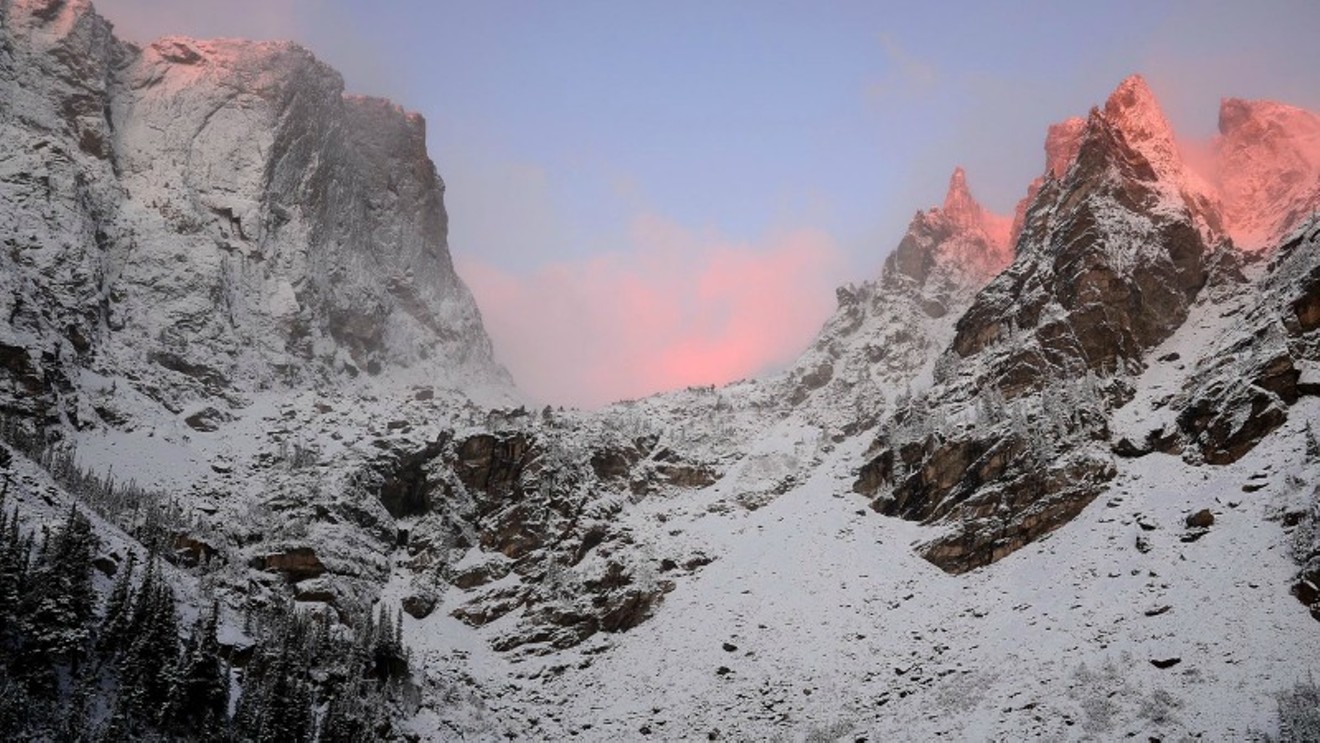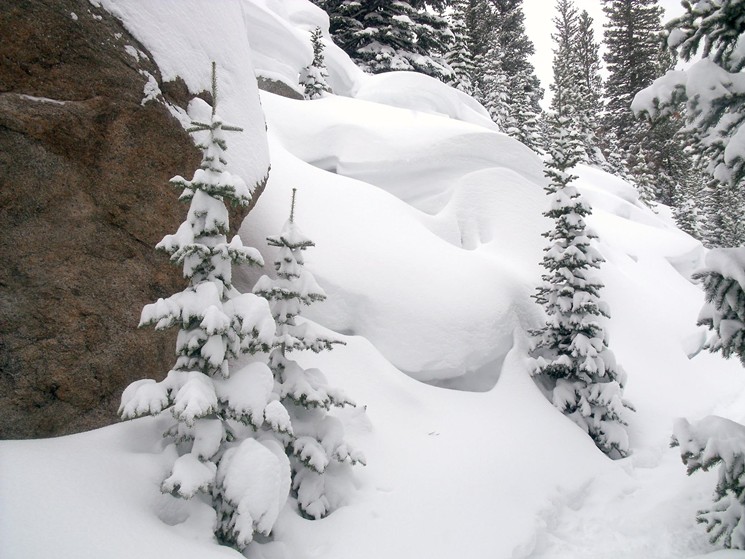Hiking in Colorado during the winter can be absolutely spectacular, but unexpected events that take place in a challenging, high-altitude environment can have dangerous or even deadly consequences.
Take this weekend's rescue at Rocky Mountain National Park.
Sheldon Seaborn, a 58-year-old from Grand Forks, North Dakota, was located in an area near Alberta Falls after spending a night in the elements. When found, he was suffering from hypothermia, disorientation and exposure-related injuries that might have proved fatal if he hadn't been spotted by a pair of early-morning skiers who quickly summoned help.
How can other hikers avoid such a fate? RMNP public-affairs officer Kyle Patterson, who spoke with us last summer about parking-lot rage and human waste concerns at the park associated with the growing popularity of the gorgeous area, offers seven tips based on common mistakes made by winter hikers that can lead to big trouble. Some of them are associated with the latest rescue, while others aren't. But taken cumulatively, they can save your life if things go wrong while communing with nature during this breathtaking but demanding season.
1. Check the weather forecast in advance.
"Looking at the conditions of where you're going to be hiking or snowshoeing or cross-country skiing is really important," Patterson says. "The weather may be fine when people start to go out in the backcountry, but then a storm can go through or the temperatures can drop and really change everything. And you need to understand the forecast at the location where you're planning on hiking. Estes Park might have one forecast, but once you get up to 9,500 feet, it might be very different."
2. Dress smart.
"You need to have the proper gear," notes Patterson, including "some kind of waterproof or water-resistant footwear, so that if you do get wet, you'll have some insulation that can assist you in not getting more wet. If you're in cotton clothing or jeans and you're not wearing proper footwear, your legs and feet can start to get wet. When that happens, you can go downhill very quickly, because your body loses the ability to keep you warm and insulate you. That causes you to get colder quicker. But the right clothing, socks and footwear can assist you in staying dry."
3. Be ready for a night outdoors.
According to Patterson, "it's important when you're hiking any time of the year, but particularly in the winter, that you're prepared to spend the night."
She admits that this concept "can be hard for people to understand. They're thinking, 'I'm just going to go a mile and then turn back.' But it's really key in many situations. People may not expect to be out late, but they may get lost or turned around — and then, when they get in distress, they don't have the equipment to keep them warm through the night."
Among the key items to load into a backpack, Patterson points out, are "the tools to start a fire in the wintertime — and also a headlamp. If it gets dark, you can use the light to assist you on a snow-packed trail. And when it gets dark out in the wilderness, it really gets dark. So you definitely need to have a headlamp with you."
4. Don't expect your cell phone to work like it does back home.
"You can't rely on your cell phone to help you know what time it is or to be able to call for help," Patterson warns. "Your battery can die for lots of different reasons. One of those reasons in the wintertime is simply the battery getting cold — and even when the battery is working, sometimes the phones don't work. Cell coverage in the mountains is very spotty."
Continue for more advice about avoiding common mistakes that can kill winter hikers.
5. Timing is everything.
"You need to time your hike to make sure you get back to the trailhead before it gets dark," Patterson advises. "It can be hard to gauge how quickly night will fall, and the time varies so much depending on the time of year. Right now, sunset is roughly about ten after five, but if you've ever spent any time in a place like Rocky, where you're often surrounded 360 degrees by mountains, it gets dark more quickly there. It's not necessarily that you're in a bowl, but because of the mountains, it gets darker sooner."
The shadows the mountains cast as the sun is descending "may mislead you into making you think you've got plenty of time to get back to the trailhead," she acknowledges. "But in the wintertime especially, when the days are shorter, it's important to give yourself ample time."
6. Don't keep your hike a secret.
"When you're hiking alone, you should always let someone know where you are and when you expect to be back," Patterson stresses. "We realize that a lot of people travel solo, but they can still tell someone, 'I'm heading out at this time, and I expect to be back at this time.' And give yourself some wiggle room. Say, 'If I'm not back in touch with you by late tonight, then please call somebody.'"
Such a suggestion won't appeal to everyone, she concedes. "People want freedom. They may think, 'I don't want somebody checking on me.' But many times, that's exactly what's needed in a number of situations where someone gets in distress and they suddenly realize that no one knows they're there. And that's a horrible feeling to have."
Another option "is to leave a note in your car indicating where your destination was," she continues. "But there are some problems with that. We don't monitor the cars at the trailhead until we've seen a car there for multiple days. Then we begin to become concerned and will check the car, and we'll find the note then. But even if you're going on a short hike, it's still a good idea to call or text a friend and let them know. It's one of those conversations that's good to have."
7. Avoid postholing.
What's postholing? Allow Patterson to explain.
"This time of year, we have a variety of different winter recreationals, including backcountry skiers and showshoers. And snowshoers often take off from popular trails, which is fine. But often people who are hiking in boots will start to follow someone's snowshoe tracks, not realizing that they're heading into an area where the snow is deeper. That's when they start postholing — sinking into the snow in places where snowshoes were able to stay on the surface."
The repercussions of postholing can be huge. "If you're on a snow-packed trail and you're in boots, you're fine, because people have patted it down," she says. "But when you start breaking through deeper snow, your socks can get cold and wet and your legs usually get pretty wet, too, unless you've got water-resistant clothing. You become tired more quickly, because you're trying to step through this super-deep snow, and you can become lost, too, because you're off the trail and following a snowshoe track that leads you to somewhere different than where you were anticipating to go. That's when people can get into trouble."
Patterson adds, "The winter and the cold temperatures can be unforgiving." In the case of Seaborn, "we were fortunate, because even though the temperature was about ten degrees, we didn't have bitter winds that would have led to even colder wind chills. But when you get cold and wet with really cold temperatures, it can be life-threatening. That makes it even more important to be prepared."
[
{
"name": "Air - MediumRectangle - Inline Content - Mobile Display Size",
"component": "12017618",
"insertPoint": "2",
"requiredCountToDisplay": "2"
},{
"name": "Editor Picks",
"component": "17242653",
"insertPoint": "4",
"requiredCountToDisplay": "1"
},{
"name": "Inline Links",
"component": "18838239",
"insertPoint": "8th",
"startingPoint": 8,
"requiredCountToDisplay": "7",
"maxInsertions": 25
},{
"name": "Air - MediumRectangle - Combo - Inline Content",
"component": "17261320",
"insertPoint": "8th",
"startingPoint": 8,
"requiredCountToDisplay": "7",
"maxInsertions": 25
},{
"name": "Inline Links",
"component": "18838239",
"insertPoint": "8th",
"startingPoint": 12,
"requiredCountToDisplay": "11",
"maxInsertions": 25
},{
"name": "Air - Leaderboard Tower - Combo - Inline Content",
"component": "17261321",
"insertPoint": "8th",
"startingPoint": 12,
"requiredCountToDisplay": "11",
"maxInsertions": 25
}
]

















